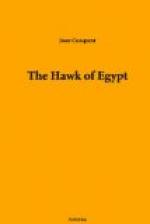Then he turned, beckoned, and gave a sharp order to the bewildered policeman, who salaamed almost to the ground.
Hugh Carden Ali bowed, to the saddle, as the great car shot smoothly forward. There was a smile of welcome on the face of the old woman who had loved his mother; a whole world of welcome in the outstretched hand and a little feeling of thankfulness in her heart; that at last she might get to know the man in time, and, with him, go to visit his mother, or, better still, win his confidence, heal his hurt, and so obviate the tedious journey.
But there was to be no drawing together of the man’s wound with the silken threads of sympathy.
He sat like a statue, with his left hand raised in salute,[1] until the Englishwomen had passed; then, throwing his falcon, he watched the confused bird’s flight in search of the quarry which was not there.
“Cry aloud to Ali the worker
of wonders,
From Him thou wilt find help from trouble.”
He quoted the first two lines from the Ned’i Ali, the formula used in the East when trouble threatens a falcon, and, touching the mare, passed down the Sharia Abbas, whilst the old lady, going in the opposite direction, came to a sudden decision.
[1]In the East the falcon is carried on the right hand.
CHAPTER XV.
“When he is best he is little
worse than a man;
and when he is worst, he is little better
than a beast.”
SHAKESPEARE.
Even as the frail little old lady sat quietly looking out at the coming of the dawn, Qatim the Ethiopian sat looking with pride round his transformed hovel in the back reaches of the bazaar. Having gathered Zulannah from the gutter where she had been thrown after the dogs had pulled her down, he carried her to his hovel and, believing her to be dead, flung her body on the heap of filthy straw which served him as couch, and then stole back—in fact, six times he made the journey—to the courtesan’s great house. He did not argue with himself, he had no theories and most certainly no moral standards: the woman was dead; there were certain things, beautiful, gaudy, glittering things in her house which his heart had always coveted, which had made his fingers to itch and his mouth to water; brute instinct told him to seize the bones before the other dogs fell upon them; and he obeyed the brutish impulse.
Hundreds of soft silken gowns; cushions of every hue; the great crimson cover from off the divan—all of these he made into a huge bundle which he carried to his den. The gold and jewelled toilet accessories, the silver basin and ewer, just because they glittered, he tied in a pair of emerald green satin curtains; various strange knives and things with prongs, with which on certain occasions the courtesan had conveyed food to her mouth—she used her fingers in private—with a jewel-encrusted nargileh of marvellous workmanship, he rolled up in a bright yellow and green Kidderminster carpet.




